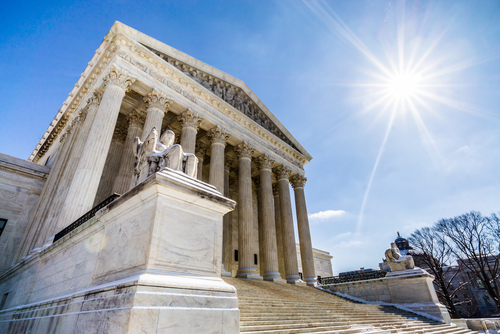
As the U.S. Supreme Court commenced a new term last week, one issue of substantial interest to many readers of this blog is whether the Court will address the constitutionality of the Securities & Exchange Commission’s use of administrative law judges (“ALJs”) to adjudicate enforcement proceedings. The issue, which we have covered extensively in past posts, essentially comes down to whether SEC ALJs are Officers subject to the Constitution’s Appointments Clause, or whether they are merely employees, who do not require appointment by the President or a Presidential appointee. The SEC currently selects ALJs through an internal administrative process, pursuant to 5 USC 3105.
Advocates on both sides of a clear circuit split have already filed petitions for writ of certiorari. Most recently, on September 29, 2017, the U.S. Department of Justice Solicitor General’s office filed a certiorari petition on behalf of the SEC asking the Court to review the Tenth Circuit’s December 2016 holding in Bandimere v. SEC. That holding, which was denied en banc review by the Tenth Circuit in May, found that SEC ALJs were “inferior Officers” and thus are subject to the Appointments Clause. After the Tenth’s Circuit ruling in Bandimere, the SEC stayed all administrative ALJ proceedings that could be appealed to the Tenth Circuit pending resolution of the issue by the Supreme Court or further order of the Commission.
On the other side of the split, investment advisor Raymond J. Luca asked the Court in July to review the D.C. Circuit’s ruling in Lucia v. SEC, which found that SEC ALJs are not Officers, but employees and thus their appointments are constitutional. The three-judge panel in Lucia determined that ALJ’s are not officers because their decisions are not final. The panel held that SEC ALJs fail to meet “the main criteria for drawing the line between inferior Officers and employees not covered by the [Appointments] Clause” established by prior D.C. Circuit decisions. That criteria includes (1) the significance of the matters resolved by the officials, (2) the discretion they exercise in reaching their decisions, and (3) the finality of those decisions. ALJ’s fail the third criteria, the Lucia panel held, because the Commission, whose five commissioners are appointed by the President, “retains discretion to review an ALJ’s initial decision either on its own initiative or upon a petition for review filed by a party or aggrieved person.” Lucia was affirmed by an en banc panel of the D.C. Circuit in per curiam order in June.
Constitutional challenges to SEC ALJ proceedings are also pending in several other circuits, including Bennett v. SEC, currently under submission to the Eighth Circuit.
It is possible that a repeal or reform of The Dodd-Frank Wall Street Reform Act of 2010, which brought about the issue by empowering the SEC to impose civil penalties through the administrative process, could make the constitutional challenges to SEC ALJs moot. If that does not happen, the Supreme Court will likely accept the case due to the circuit split, the resulting inconsistent treatment of cases (particularly in light of the SEC’s staying cases appealable to the Tenth Circuit), and the high-profile nature of the issue.
If and when the Court does consider the case, its decision may come down to an interpretation of its 1991 decision in Freytag v. Commissioner of Internal Revenue. Freytag held that “special trial judges” of the United States Tax Court were “inferior Officers” because, among other reasons, they “perform more than ministerial tasks” and “exercise independent authority.” Thus, their appointments had to conform to the Appointments Clause. Other Supreme Court cases dealing with related issues, including Buckley v. Valeo (1975), Free Enterprise Fund v. PCAOB (2010), Weiss v. United States (1994), and Edmond v. United States (1997), are cited by both sides in their cert pleadings and will be play important parts in the argument.
Meanwhile, the SEC’s Enforcement Division has experienced several rare defeats in front of ALJs this year. Most recently, an ALJ dismissed fraud charges against the “Diva of Distressed” Lynn Tilton in September on grounds that, though collateralized loan obligations that her company sold to sophisticated investors did not make it easy for investors to find information, Tilton “also did not conceal – omit to state – material information.” Additionally, in August, an SEC ALJ dismissed fraud charges against the former head of Standard & Poor’s commercial mortgage-backed securities group Barbara Duka; and, in April, an SEC ALJ dismissed insider trading charges against Georgia real estate developer Charles Hill, Jr.
Those who haven’t fared as well in SEC ALJ proceedings will be watching closely to see how the Supreme Court handles this issue. An eventual ruling by the Court that the ALJ proceedings are unconstitutional could call into doubt many (and possibly all) prior judgments by SEC-appointed ALJs, particularly involving defendants who raised objections to the proceedings or appealed adjudications on constitutional grounds. In apparent recognition of this fact, the SEC has begun filing its litigated actions (as opposed to a settled actions) in federal district court.

